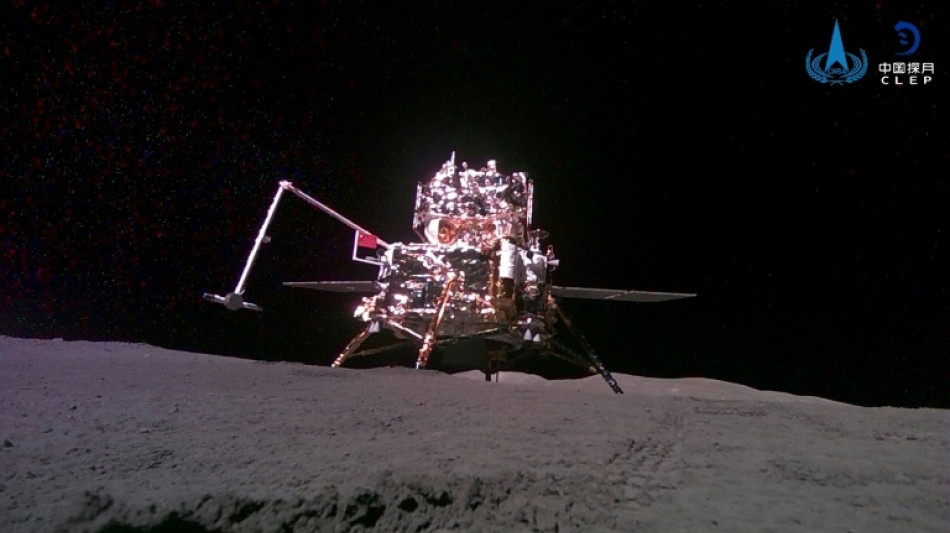
-
 Osaka emerges for Melbourne opener under white hat and umbrella
Osaka emerges for Melbourne opener under white hat and umbrella
-
Malawi suffers as US aid cuts cripple healthcare

-
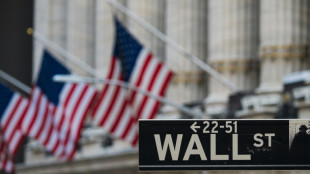 Bessent says Europe dumping US debt over Greenland would 'defy logic'
Bessent says Europe dumping US debt over Greenland would 'defy logic'
-
Freeze, please! China's winter swimmers take the plunge

-
 Talks between Damascus, Kurdish-led forces 'collapse': Kurdish official to AFP
Talks between Damascus, Kurdish-led forces 'collapse': Kurdish official to AFP
-
In-form Bencic makes light work of Boulter at Australian Open

-
 Spain mourns as train disaster toll rises to 41
Spain mourns as train disaster toll rises to 41
-
Sinner into Melbourne round two as opponent retires hurt

-
 Israel begins demolitions at UNRWA headquarters in east Jerusalem
Israel begins demolitions at UNRWA headquarters in east Jerusalem
-
Almost half of Kyiv without heat, power, after Russian attack: govt

-
 Veteran Monfils exits to standing ovation on Australian Open farewell
Veteran Monfils exits to standing ovation on Australian Open farewell
-
Precision-serving former finalist Rybakina powers on in Melbourne

-
 South Korea's women footballers threaten boycott over conditions
South Korea's women footballers threaten boycott over conditions
-
Equities sink, gold and silver hit records as Greenland fears mount
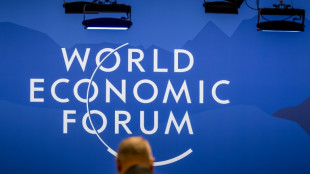
-
 Australian lawmakers back stricter gun, hate crime laws
Australian lawmakers back stricter gun, hate crime laws
-
EU wants to keep Chinese suppliers out of critical infrastructure
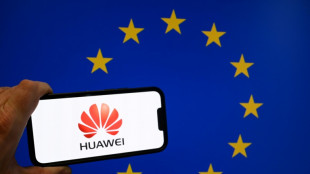
-
 AI reshaping the battle over the narrative of Maduro's US capture
AI reshaping the battle over the narrative of Maduro's US capture
-
Penguins bring forward breeding season as Antarctica warms: study

-
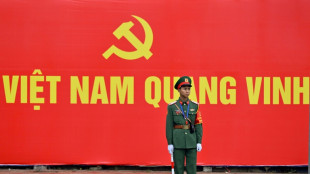 Vietnam leader pledges graft fight as he eyes China-style powers
Vietnam leader pledges graft fight as he eyes China-style powers
-
Ukrainian makes soldier dad's 'dream come true' at Australian Open

-
 'Timid' Keys makes shaky start to Australian Open title defence
'Timid' Keys makes shaky start to Australian Open title defence
-
Indiana crowned college champions to complete fairytale season

-
 South Koreans go cuckoo for 'Dubai-style' cookies
South Koreans go cuckoo for 'Dubai-style' cookies
-
Harris leads Pistons past Celtics in thriller; Thunder bounce back

-
 Tjen first Indonesian to win at Australian Open in 28 years
Tjen first Indonesian to win at Australian Open in 28 years
-
Long-delayed decision due on Chinese mega-embassy in London

-
 Djokovic jokes that he wants slice of Alcaraz's winnings
Djokovic jokes that he wants slice of Alcaraz's winnings
-
Trump tariff threat 'poison' for Germany's fragile recovery

-
 Tourists hit record in Japan, despite plunge from China
Tourists hit record in Japan, despite plunge from China
-
Jittery Keys opens Melbourne defence as Sinner begins hat-trick quest

-
 The impact of Trump's foreign aid cuts, one year on
The impact of Trump's foreign aid cuts, one year on
-
Belgian court weighs trial for ex-diplomat over Lumumba killing

-
 Inside China's buzzing AI scene year after DeepSeek shock
Inside China's buzzing AI scene year after DeepSeek shock
-
Asian markets sink, silver hits record as Greenland fears mount
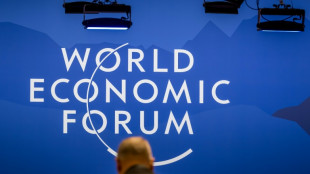
-
 Shark bites surfer in Australian state's fourth attack in 48 hours
Shark bites surfer in Australian state's fourth attack in 48 hours
-
North Korea's Kim sacks vice premier, rails against 'incompetence'
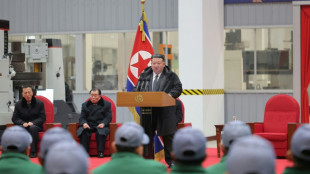
-
 Spain mourns as train crash toll rises to 40
Spain mourns as train crash toll rises to 40
-
'Very nervous' Keys makes shaky start to Australian Open title defence

-
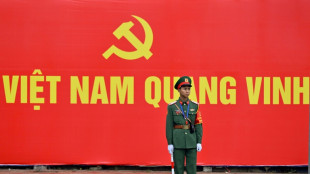 Vietnam leader promises graft fight as he eyes China-style powers
Vietnam leader promises graft fight as he eyes China-style powers
-
Dad-to-be Ruud ready to walk away from Australian Open

-
 North Korea's Kim sacks senior official, slams 'incompetence'
North Korea's Kim sacks senior official, slams 'incompetence'
-
Farewells, fresh faces at Men's Fashion Week in Paris

-
 'I do not want to reconcile with my family' says Brooklyn Peltz Beckham
'I do not want to reconcile with my family' says Brooklyn Peltz Beckham
-
EU leaders take stage in Davos as Trump rocks global order

-
 Blast at Chinese restaurant in Kabul kills 7
Blast at Chinese restaurant in Kabul kills 7
-
Warner hits 'Sinners' and 'One Battle' tipped for Oscar nominations

-
 Colombian paramilitary-turned-peace-envoy sentenced over atrocities
Colombian paramilitary-turned-peace-envoy sentenced over atrocities
-
Gilgeous-Alexander leads Thunder in rout of Cavaliers

-
 Seahawks blow as Charbonnet ruled out for rest of season
Seahawks blow as Charbonnet ruled out for rest of season
-
Kostoulas stunner rescues Brighton draw after penalty row


China sees commercial sector as next frontier in US space race
A world-first launch from the far side of the Moon this week showcased China's progress in space, and Beijing now wants its commercial sector to catch up to rivals such as Elon Musk's SpaceX.
Chinese companies lag far behind American frontrunners led by SpaceX, which plans to launch Starship, a massive prototype rocket that may one day send humans to Mars, on Thursday.
The gap is narrowing, however, as Beijing realises the value a solid commercial sector can add to its existing capabilities, experts told AFP.
It could even become similar to the development of electric vehicles where EV pioneer Tesla, also founded by Musk, was an early mover in China but now faces fierce competition from a host of homegrown rivals, said analyst Chen Lan.
"In five years, SpaceX may feel pressure," Chen told AFP.
"The situation in today's EV market will probably happen again when a lion (Tesla or SpaceX) faces a pack of wolves (Chinese companies)."
Tesla was recently overtaken by China's BYD as the world's top seller.
Beijing only opened up parts of the space sector to private capital in late 2014 but hundreds of companies have since sprung up.
A CERES-1 commercial rocket, for example, sent three satellites into orbit on Thursday, one of dozens of launches planned this year.
"China's commercial space sector is impressively large and deep," said Blaine Curcio, founder of Orbital Gateway Consulting.
While SpaceX is "vastly ahead" of its Chinese equivalent, "if we compare the fifth, or the 10th most-developed launch companies in the US and China, China is probably ahead", he said.
- Vital launching capacity -
China's government has sent humans into orbit, built a space station and landed rovers on the Moon and Mars -- where it aims to send crewed missions by 2030 and 2033 respectively.
In contrast, Chen said, the commercial sector is currently focused on low-cost launch vehicles and small satellites.
However, this launching capacity will be critical to China's aim of establishing satellite mega-constellations, state broadcaster CCTV reported in April.
China is developing two such networks: Guowang, set to consist of 13,000 spacecraft, and G60 Starlink, envisioned at 12,000.
Chinese satellites currently in orbit, though, number in the hundreds rather than thousands.
CCTV said speed was vital because China's satellite plans face multiple competitors and a limit on both the number of spacecraft in orbit and available frequencies for use.
Its report made repeated references to SpaceX, whose Falcon 9 rockets act as workhorses for NASA, and whose Starlink satellite constellation now covers dozens of countries.
China harnessing commercial launching capacity in a similar way would "help traditional state-owned players focus on civil and military programmes... while also boosting China's overall launch and space capabilities and meeting national strategic goals", wrote SpaceNews.com's Andrew Jones.
The opportunity must be grasped in the next five to 10 years "to help our country seize the right to speak in the space of the future", CCTV quoted a representative of domestic firm LandSpace as saying.
Control of the cosmos is already another arena for US-China rivalry, with both accusing the other of hiding its space programme's military objectives.
The next decade of competition with China was the "most critical 10 years" in history, a former US Space Command chief said recently.
"We cannot afford to lose," he said.
- 'Deep links' -
There are "deep links" between China's state and commercial sectors, said Curcio, with many companies founded by former employees from state-run companies or academics from government institutes.
Still, the central government is increasingly throwing its weight behind the sector.
It was termed a "strategic emerging industry" to be "nurtured" at an annual meeting of China's top decision-makers last December.
"Almost every province has some kind of space industry development plan, many cities have the same," said Curcio.
China made 26 commercial launches in 2023, according to state media, including LandSpace's Zhuque-2 rocket, the world's first methane-fuelled rocket.
"The next milestone will be a Falcon 9-class launcher and first stage re-use," said Chen, which several companies were expected to achieve in 2024.
The commercial sector should make up 30 of China's planned 100 launches this year.
By comparison, SpaceX comprised 98 of 109 US launches in 2023, according to astrophysicist Jonathan McDowell, highlighting the US company's superiority for now.
But the situation could be "totally different" in five years, said Chen, "as the gap continues to narrow".
T.Ziegler--VB



